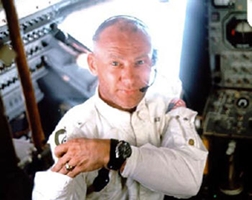Over Forty years ago, two men landed on the moon. One of them spoke
unforgettable words. The other did something equally momentous.
– Article by Neil Earle –

An Episcopalian, Buzz Aldrin had somehow wedged into his stowage pouch a plastic bag. In it were a small flask of wine, a chalice and some wafers. About 5:57 p.m. Houston time, he set the elements on the fold-down guidance-computer table. He spoke into his microphone: “This is the LM [Lunar Module] pilot speaking. I’d like to take this opportunity to ask every person listening in to pause for a moment and contemplate the events of the past few hours, and to give thanks in his or her own way.”
Aldrin’s way of giving thanks was to gently pour the wine into the chalice. He then recited—silently, as NASA had requested—John 15:5, “I am the vine; you are the branches…. Without me you can do nothing.”
Taking Communion on the moon!
Back to God
This remarkable story is relayed in Andrew Chaikin’s history, A Man on the Moon: The Voyage of the Apollo Astronauts. Back on earth, Aldrin’s wife Joan marveled—Buzz had not forgotten the deeper significance of what was happening on July 20, 1969. On his return to earth, Aldrin reflected aloud on the meaning of Psalm 8:3-4, words written some 2,800 years earlier by another gazer into the starry night: “When I consider your heavens, the work of your fingers, the moon and the stars, what you have set in place, what is man that you are mindful of him, the son of man that you care for him?”
Ironically, humanity’s most stunning technological feat took some of its key participants back—if only for a few moments—to their own humble place in the cosmos. As the apostle Paul told a group of advanced thinkers back in Athens, Greece, in the first century, God is not far from every one of us (Acts 17:27).
The world has all but forgotten Buzz Aldrin’s call to thanksgiving and his Communion service, standing as they do in the shadow of Neil Armstrong’s famous words, “That’s one small step for a man, one giant leap for mankind.” But that humble acknowledgment from space of our dependence on the Creator of all things and our union with Jesus Christ speaks to the quality of human life in ways that will forever transcend even our most amazing technological achievements.
Copyright 2009 – Christian Odyssey